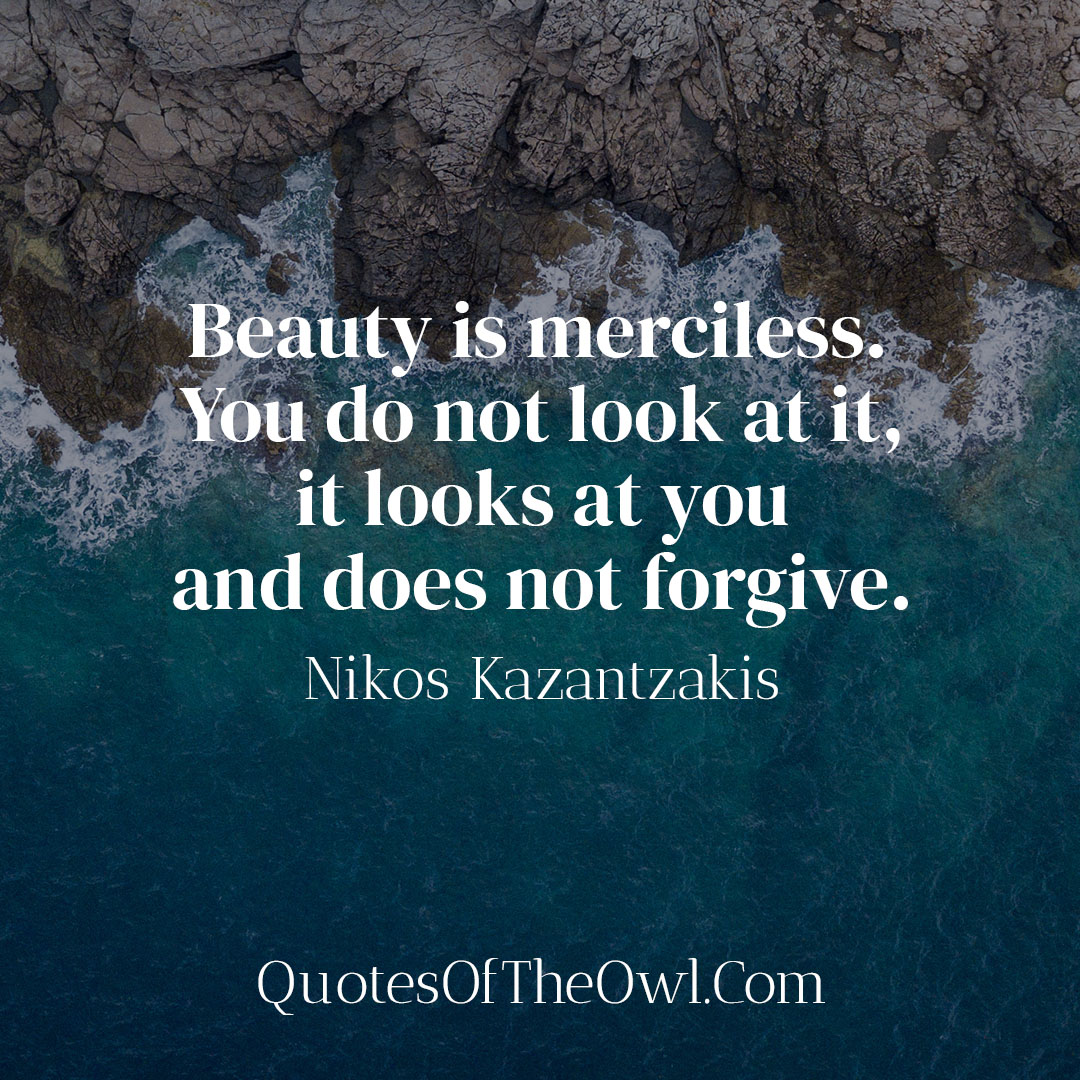What is the meaning behing Nikos Kazantzakis’s iconic Quote “Beauty is merciless. You do not look at it, it looks at you and does not forgive”?
Nikos Kazantzakis, one of the most celebrated writers in modern Greek literature, is known for his profound insights into the human condition. One of his most iconic quotes is “Beauty is merciless. You do not look at it, it looks at you and does not forgive.” This statement has intrigued many and has been the subject of much analysis and interpretation. In this article, we will explore the meaning behind this quote and its significance in today’s world.
Understanding the Quote
At first glance, Kazantzakis’s quote seems paradoxical. How can something as beautiful as beauty be merciless? To understand this, we need to delve deeper into the meaning of the words. Beauty is not just a superficial quality; it is an experience that affects us on a profound level. When we encounter something beautiful, it has the power to move us, to touch our souls, and to evoke emotions that we may not have known existed. But with this power comes a responsibility.
Kazantzakis implies that beauty demands something from us. It requires us to pay attention, to engage with it fully, and to be receptive to its impact. It is not something that we can simply observe from a distance; we must be willing to immerse ourselves in it. This is what he means when he says, “You do not look at it, it looks at you.” Beauty is not a passive entity; it demands an active engagement from us. We must be willing to enter into a relationship with it, to let it speak to us, and to be open to its transformative power.
The second part of the quote – “and does not forgive” – emphasizes the consequences of failing to recognize beauty’s demands. If we ignore beauty, we risk missing out on something essential. We deprive ourselves of the opportunity to experience something that can enrich our lives and make us more fully human. In this sense, beauty is merciless because it does not offer second chances. If we fail to engage with it fully, we may never have the opportunity again.
Beauty and Perception
Beauty is not an objective quality. What one person finds beautiful, another may not. This is why Kazantzakis’s quote emphasizes the role of the observer. Beauty is not something that exists independently of us; it is something that we create through our perceptions. In this sense, the quote can be seen as an invitation to pay attention to our own subjective experience of beauty. It encourages us to be aware of the ways in which our perceptions shape our understanding of the world around us.
At the same time, the quote also acknowledges that our perceptions are shaped by external factors. We are influenced by the culture and society in which we live. Our understanding of beauty is not simply a matter of our personal taste; it is also shaped by the values and beliefs of the communities in which we are embedded. This can lead to a narrow conception of beauty that excludes certain people or perspectives. Kazantzakis’s quote challenges us to expand our understanding of beauty and to be open to perspectives that may be different from our own.
Beauty and Responsibility
Kazantzakis’s quote also implies a responsibility on the part of the individual to recognize and appreciate beauty. This is not just a personal responsibility, but also a social one. We have a responsibility to cultivate a culture that values and celebrates beauty in all its forms. This means being willing to engage with art, nature, and other forms of beauty, even if they challenge us or make us uncomfortable.
At the same time, we also have a responsibility to recognize the ways in which beauty can be used to exclude or marginalize certain people or perspectives. We must be willing to challenge beauty standards that perpetuate harmful ideas or stereotypes. This requires us to be aware of our own biases and to be open to learning from others.
Book Recommendations
Conclusion
In conclusion, Kazantzakis’s quote “Beauty is merciless. You do not look at it, it looks at you and does not forgive” invites us to pay attention to the transformative power of beauty. It reminds us that beauty demands something from us – an active engagement, an openness to new perspectives, and a willingness to recognize its impact on our lives. At the same time, it also implies a responsibility on the part of the individual and society to cultivate a culture that values and celebrates beauty in all its forms. By doing so, we can create a world that is more just, more inclusive, and more beautiful.

